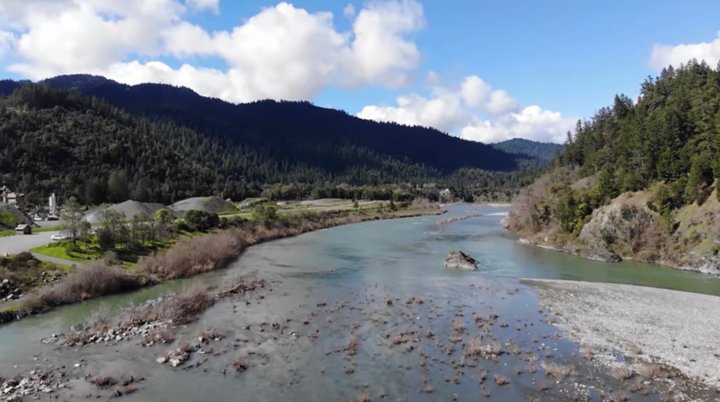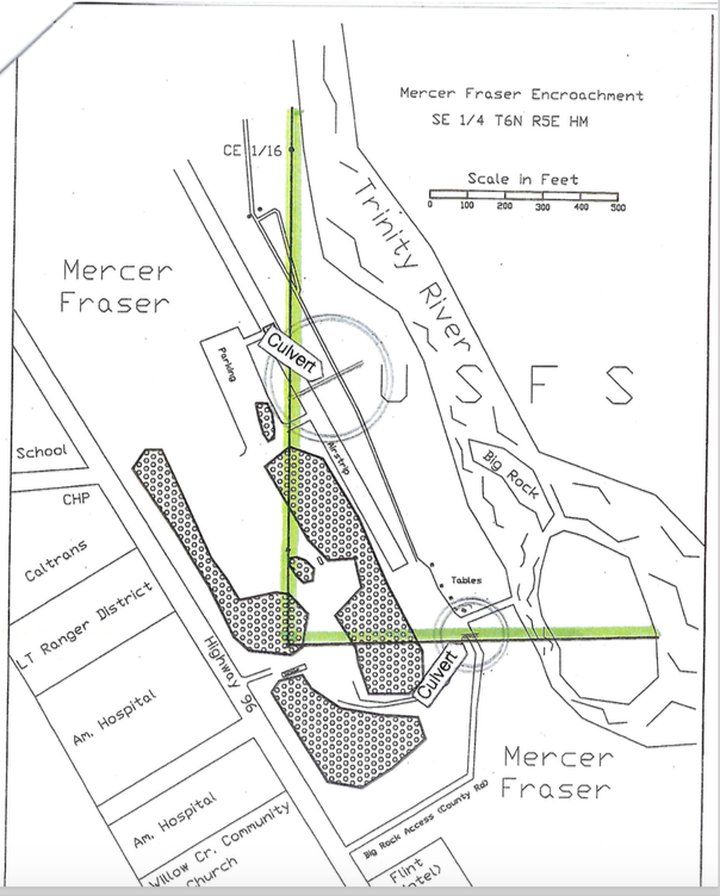
Mercer-Fraser Co.’s Willow Creek gravel yard can be seen in background of this aerial shot of the Big Rock recreation area on the Trinity River. | Screenshot of video from YouTube user Recycled Redwood Photography.
For the past four decades, the U.S. Forest Service and Eureka-based construction firm Mercer-Fraser Co. have been trespassing on each other’s property near Willow Creek in what amounts to “a bum deal for taxpayers,” according to a letter of complaint sent earlier this week to the Inspector General of the U.S. Department of Agriculture by two local environmental groups.
The Environmental Protection Information Center (EPIC) and the Northcoast Environmental Center (NEC) allege that Six Rivers National Forest has an informal “quid pro quo” arrangement with Mercer-Fraser, allowing the construction company to keep a pile of gravel mining debris on a corner of public property without the requisite special use permits. In exchange, the groups say, the Forest Service gets to use part of Mercer-Fraser’s adjacent property as a helipad and another part to hold physical fitness tests for wildland firefighters.
The properties in question include the Big Rock Day Use Area, a popular swimming spot on the Trinity River, as well as the access road to get there, which runs along a public right-of-way that Mercer-Fraser granted to the county years ago.

A map showing Mercer-Fraser Co.’s encroachment on U.S. Forest Service Land near the Big Rock recreation area on the Trinity River. | From documents provided to EPIC from a Freedom Of Information Act request.
Mercer-Fraser has kept gravel mining debris on three acres of the southwest corner of the Forest Service parcel since about 1968, and company President Justin Zabel tells the Outpost that this “longstanding agreement” with the Forest Service is not a big deal.
“This is nothing new, and it’s not controversial for either one of us,” Zabel said.
The letter from EPIC and the NEC says that for many years the Forest Service issued special use permits to Mercer-Fraser. “However, starting in approximately 1989, Mercer Fraser no longer maintained a special use permit,” the letter says.
The two sides have elected to maintain this state of affairs because they both get something out of the deal, according to EPIC and the NEC, though their letter quotes from an internal memo by a Forest Service employee who calls the deal “essentially one-sided” because Mercer-Fraser is “difficult to deal with … and extorting us for rental of a fire heliport while we sell them valuable gravel and allow them to use 3 acres of [Forest Service] land next to our Recreation site without permit and without payment.”
Zabel said the Forest Service only pays the company rent when they need the facilities during fire season, and he said he’s not sure why the environmental groups are opposed to this. “They’re saying government and private industry can’t work together?” he asked.
The environmental groups also make note of Mercer-Fraser’s request for changes to the zoning and land use designations on their parcel. As with their property in Glendale, Mercer-Fraser has asked the county to change the land use designation on their Willow Creek gravel mine from Commercial Recreational to Industrial-Resource Related and the zone classification from Highway Service Commercial to Heavy Industrial.
Company executives and county officials say these changes are needed to accurately reflect the longstanding gravel mining operations on these properties, but critics argue that these changes could open the floodgates to a variety of other activities on the properties, including cannabis extraction facilities.
A proposal for such a facility on Mercer-Fraser’s Glendale property became a political flashpoint earlier this year, with staff from the Humboldt Bay Municipal Water District protesting that the proposed lab would jeopardize the drinking water supply for a majority of county residents. Mercer-Fraser later withdrew its plans for a weed extraction facility on that site, apparently thanks to strong urging from Humboldt County Supervisor Ryan Sundberg.
But in their letter of complaint, EPIC and the NEC note that Mercer-Fraser still intends to build a cannabis extraction facility at its Willow Creek property. Zabel confirmed that the company continues to explore this possibility, though he noted that there are far more expansive plans from other property owner elsewhere along the river.
EPIC and the NEC ask the Inspector General of the U.S. Department of Agriculture to conduct a full investigation and “resolve the longstanding trespass of public lands.”
Zabel, meanwhile, insists this is much ado about nothing.
Read the complaint below.
# # #
DOCUMENT: Complaint to Inspector General
CLICK TO MANAGE